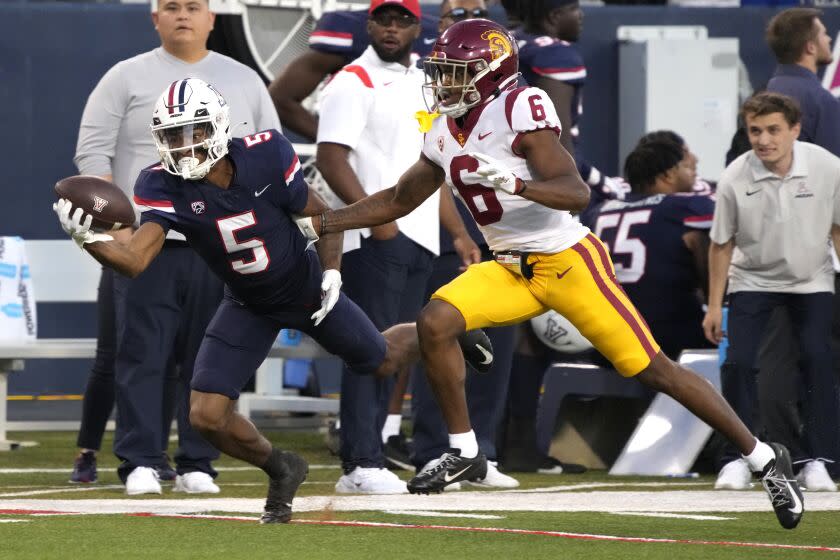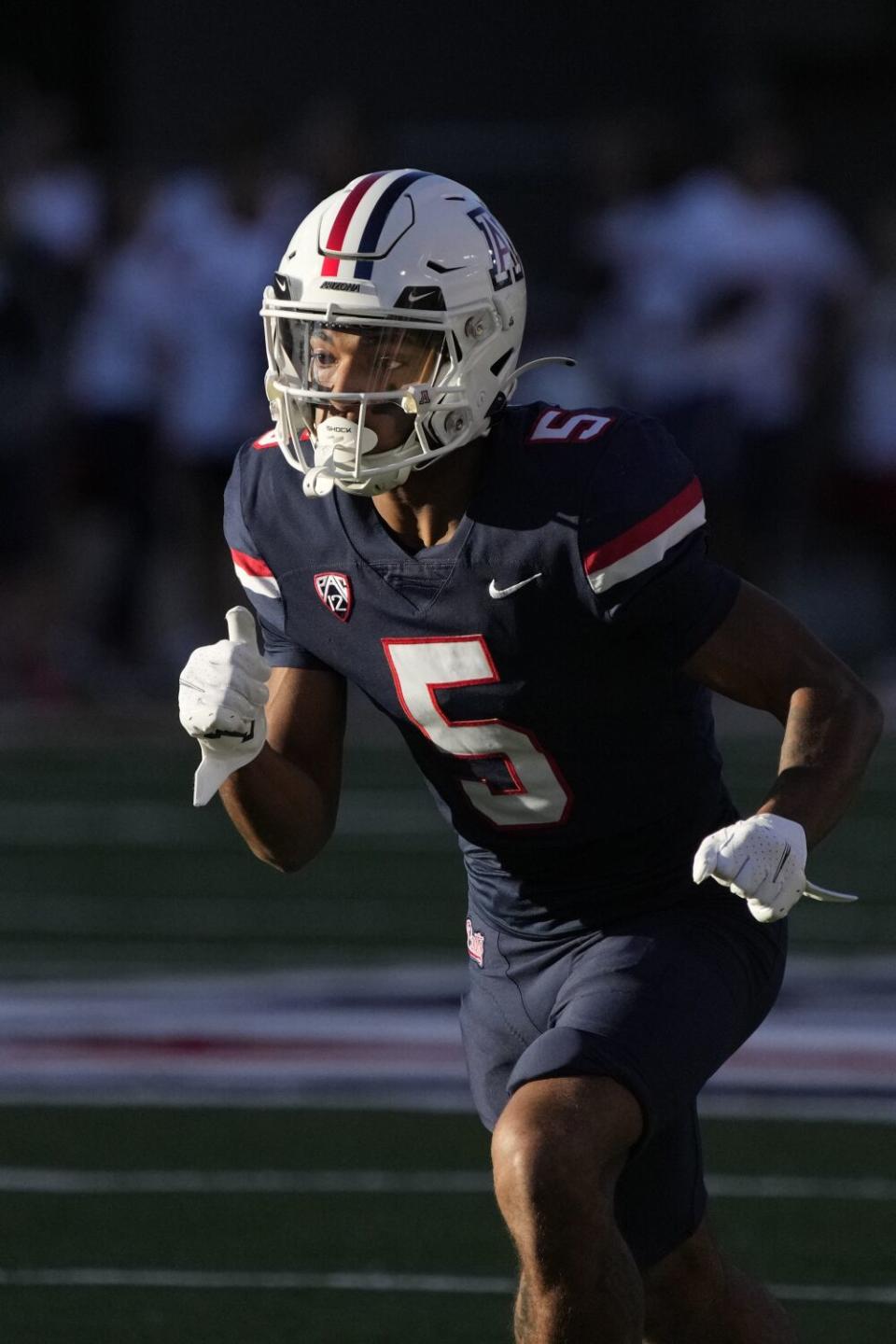Elite USC receiver Dorian Singer never gave up his dream of playing on a big stage

Dana Zupke couldn’t make sense of it. As the longtime head coach at Pinnacle High in Arizona, he had seen many kids fall through the football recruiting cracks. That was just the reality of college football these days. But Dorian Singer was not just any kid.
Zupke only coached the wide receiver for one season, but it was more than enough to know Singer was special. His hands, Zupke says, “were incredible.” The coach joked that he might have bet a year’s salary on Singer pulling down a 50-50 ball. “Just jaw-dropping stuff,” he said.
Still, here was Singer in May of his senior year, his first and only at Pinnacle, without any Football Bowl Subdivision scholarship offers to his name. That hadn’t always been the case. Texas had offered. Iowa State too. The receiver had been holding out for others, namely one from Louisiana State, his dream school, but they never materialized. Then, for one reason or another, the first offers he got dried up too.
“It was kind of the perfect storm, in a negative way, for Dorian,” Zupke explained.
Before he would emerge as one of the most coveted receivers on the transfer market, trading Arizona for USC this offseason, Singer moved from Minnesota to Arizona in 2020 with the hope it might drum up an offer or two.
It was a bleak picture for any prospect in his position. The pandemic — and the extra year of eligibility the NCAA handed out with it — made scholarships more scarce than ever. Just getting attention from schools wasn’t easy. He didn’t have a national profile yet. On paper, his measurables didn’t blow anyone away. Nothing about Singer was flashy either, down to the reserved, yes-sir, no-sir demeanor.
But Singer was certain that he belonged. So certain that he kept waiting, even as no space ever came open at LSU. Even as Texas coach Tom Herman was fired, replaced by Steve Sarkisian, who chose not to honor the offer to Singer.
Zupke, searching for some explanation, wondered whether he might be to blame. Had he not done enough to help Singer? The receiver remained surprisingly calm about his circumstances.
“I was stressed for him,” Zupke said. “I was like, this kid is too good to not have a scholarship leaving my school.”
Singer’s options were limited as he considered his next steps in May 2021. Northern Arizona, a Football Championship Subdivision school, was pursuing him relentlessly. Arizona also expressed interest but had no available scholarships to offer. If he wanted to play Power Five football, he would have to start as a preferred walk-on, hoping Arizona would follow through the next season.

At the time, Singer acknowledges, he didn’t really understand what it meant to be a walk-on.
Zupke tried to convince him to go the Football Championship Subdivision route. At Northern Arizona, he had a guaranteed scholarship. Probably an immediate starting job too.
“But Dorian just wasn’t having it,” Zupke said. “He was confident enough in himself that he was like, ‘I don’t need to settle for an FCS school.’ He wanted to prove himself on a higher stage.”
Arizona coach Jedd Fisch kept his word. Soon after his freshman season, Singer was put on scholarship. It didn’t take long after that to prove he had been worth it.
By late last October, as USC made the trip to Tucson, Singer had already established himself as one of the Pac-12 Conference's best pass catchers. Then, on his biggest stage yet, he starred. He torched the Trojans for 141 yards and three touchdowns on seven catches, all with his family and friends from Minnesota watching from the stands.
“Hard work goes a long way,” Singer said. “I just believed in myself, and the results showed.”
This time, he had no problem catching the attention of a college staff. Dennis Simmons, USC’s receivers coach, had seen enough.
"His catch radius, his body control obviously was off the chart in the game against us,” Simmons said.
When Singer entered the transfer portal, Simmons and fellow USC assistant Luke Huard called him immediately after it opened. It didn’t take much convincing for Singer — especially after he learned two other Arizona players, defensive tackle Kyon Barrs and cornerback Christian Roland-Wallace, were also considering transferring to USC.
The Trojans' offense, Singer explained, happened to be a perfect fit for his skill set. “They like to go deep, take the deep shots,” he said. The notion of catching passes from a Heisman Trophy winner, quarterback Caleb Williams, didn’t hurt either.
With Jordan Addison on his way to the NFL, Lincoln Riley needed an elite receiver capable of taking the top off opposing defenses. USC’s coach didn’t have to look far for Singer, whose 14 catches of 20 yards or more last season were the sixth most among college wide receivers.
Hard work goes a long way. I just believed in myself, and the results showed.
USC receiver Dorian Singer
Already this spring, he has earned a reputation for his reliability, Riley said.
“Tremendous ball skills, just some catches that kind of make you go, 'Wow,’ ” Riley said. “It kind of becomes a point where you're a little surprised if he doesn't come down with it, no matter how tough it looks. He just kind of finds a way.”
It’s a fitting sentiment for the Trojans' new star receiver, who, not long ago, was left without an FBS offer.
“This whole process for me has been different than for everybody else,” Singer said. “If you believe, then things just happen.”
This story originally appeared in Los Angeles Times.

